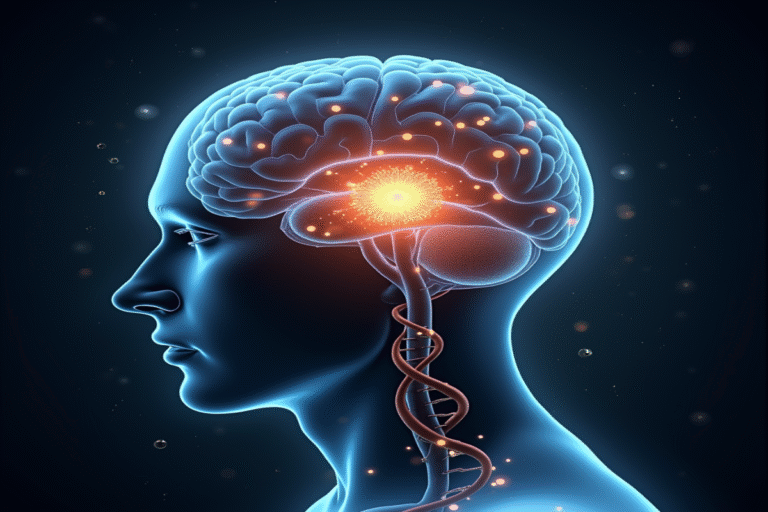Ever wondered how your body seems to know when it’s time to wake up, even without an alarm clock? The answer lies in a fascinating internal timekeeper that’s been ticking away inside you since before you were born.
The Master Clock in Your Brain
Deep within your brain, nestled in a region called the hypothalamus, sits a tiny cluster of about 20,000 nerve cells known as the suprachiasmatic nucleus (SCN). Despite its small size—no larger than a grain of rice—this neural command center orchestrates the timing of virtually every physiological process in your body, from hormone release to temperature regulation and sleep-wake cycles.
What’s truly remarkable? If scientists isolate these cells in a laboratory dish, they continue to maintain their rhythmic activity, firing signals in a pattern that completes one cycle approximately every 24 hours. Your internal clock is literally built into your cells!
How Light Resets Your Clock Daily
Your eyes contain special photoreceptor cells that have nothing to do with vision. Called intrinsically photosensitive retinal ganglion cells, these specialized neurons contain a light-sensitive protein called melanopsin. When morning light hits these cells, they send direct signals to your SCN, essentially telling your body, “It’s daytime—time to be alert!”
This daily light exposure is crucial because our internal clocks actually run slightly longer than 24 hours for most people—about 24.2 hours on average. Without the synchronizing power of sunlight, our rhythms would gradually drift out of alignment with the external world.
Fascinating fact: Even blind people who cannot see images can still have their circadian rhythms synchronized by light, as long as these special non-visual photoreceptors remain functional.
The Hormone Dance: Melatonin and Cortisol
Your biological clock coordinates an intricate hormonal ballet that determines when you feel sleepy or alert:
- Melatonin: Often called the “darkness hormone,” melatonin production ramps up in the evening as light fades. Your pineal gland releases this hormone, signaling to your body that it’s time to prepare for sleep. Blue light from screens can suppress melatonin production, which is why screen time before bed can disrupt sleep.
- Cortisol: This “awakening hormone” follows a sharp circadian pattern, with levels peaking about 30-45 minutes after waking—a phenomenon known as the Cortisol Awakening Response (CAR). This surge helps mobilize energy resources and increase alertness to start your day.
Your Body Temperature Follows the Rhythm
Your core body temperature fluctuates by about 1°F throughout the day, reaching its lowest point around 4-5 AM for most people—typically about two hours before natural awakening. As morning approaches, your temperature begins to rise, preparing your body and brain for wakefulness. This temperature cycle persists even in constant conditions, revealing the intrinsic nature of your circadian rhythm.
Genetic Timekeepers
The discovery of “clock genes” earned scientists the Nobel Prize in Physiology or Medicine in 2017. These genes—with fascinating names like CLOCK, PERIOD, and TIMELESS—create proteins that rise and fall in concentration over approximately 24-hour cycles. This molecular oscillation occurs in nearly every cell of your body, from your liver to your skin!
Even more surprising: different organs have their own “peripheral clocks” that can run on slightly different schedules, all coordinated by the master SCN clock in your brain.
Why Some People Are Naturally Early Birds or Night Owls
Your preferred sleep-wake timing, known as your chronotype, is partly genetic. Variations in clock genes can make your internal day naturally shorter (making you an early bird) or longer (making you a night owl). These differences aren’t just preferences—they reflect fundamental biological variations in how your circadian system operates.
One specific gene variant, a mutation in the CRY1 gene, can cause people to have a circadian day that’s significantly longer than 24 hours, leading to a condition called Delayed Sleep Phase Syndrome.
When Rhythms Get Disrupted
Modern life often conflicts with our biological timekeeping. When we experience jet lag or work night shifts, our internal clocks struggle to adjust, creating a state similar to chronic jet lag. Research has linked circadian disruption to increased risks of various health problems, including:
- Metabolic disorders and obesity
- Cardiovascular disease
- Mood disorders like depression
- Compromised immune function
- Increased cancer risk (night shift work is classified as a “probable carcinogen”)
The Social Jet Lag Phenomenon
Many people experience “social jet lag”—the mismatch between their biological clock and social obligations. If you sleep later on weekends to “catch up” on sleep, you’re likely experiencing this phenomenon. This weekly disruption can impact health similar to regular travel across time zones.
Respecting Your Biological Rhythms
The science of circadian rhythms offers practical wisdom for daily life:
- Seek morning light: 20-30 minutes of morning sunlight helps maintain healthy circadian alignment.
- Keep consistent sleep schedules: Even on weekends, try to maintain similar sleep-wake times.
- Dim lights in the evening: Reduce blue light exposure from screens and use warmer lighting after sunset.
- Time your meals: Emerging research suggests that aligning eating with your circadian rhythm—eating within a 10-12 hour window—may support metabolic health.
Beyond Sleep: Your Many Circadian Rhythms
While sleep is the most obvious manifestation of circadian rhythms, virtually every aspect of your physiology follows these daily patterns:
- Cognitive performance peaks in the late morning for most people
- Physical coordination and muscle strength typically peak in the afternoon
- Liver detoxification is most active in the early morning hours
- Even your immune system follows circadian patterns, with certain immune functions more active at night
Perhaps most incredible is how this internal symphony has evolved over millions of years, precisely tuned to Earth’s rotation. Your biological clock isn’t just keeping time—it’s connecting you to the fundamental rhythms of our planet, a living link to the cosmic dance that has shaped life since its beginnings.
The next time you naturally wake up moments before your alarm, remember: it’s not coincidence or magic, but the remarkable precision of your biological timekeeping system, silently orchestrating the complex processes that keep you alive and in sync with the world around you.





